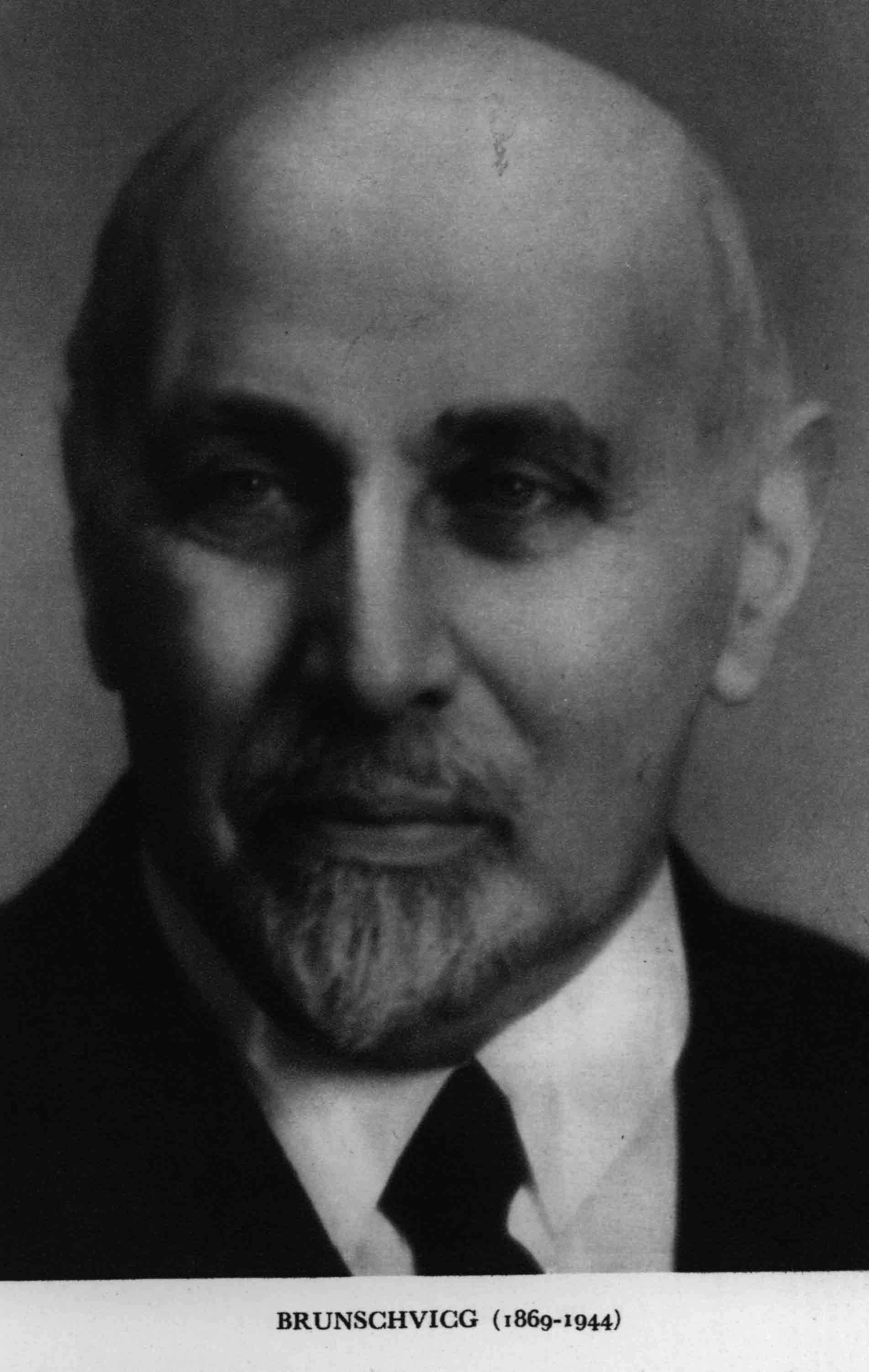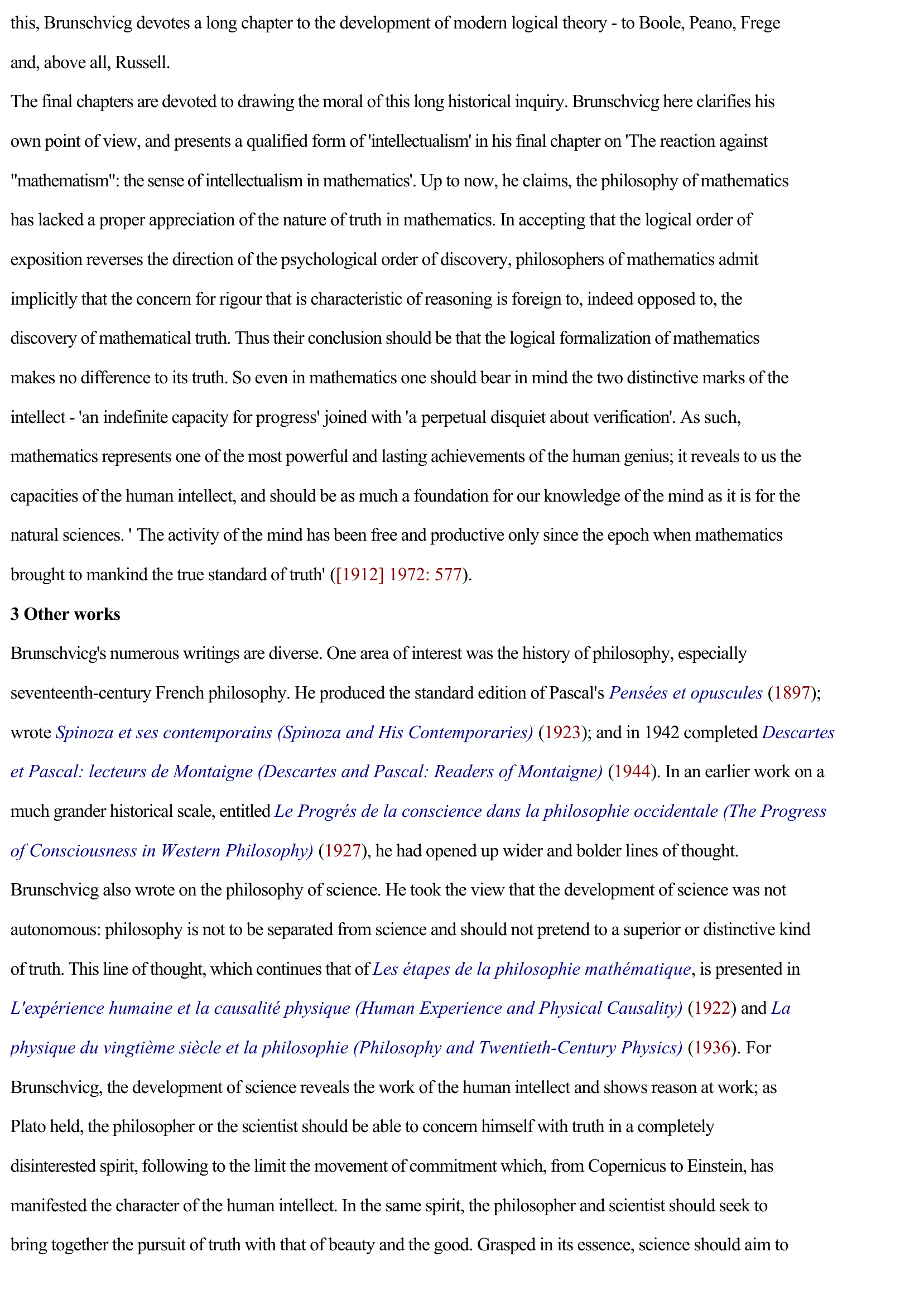Brunschvicg, Léon
Publié le 22/02/2012

Extrait du document


«
this, Brunschvicg devotes a long chapter to the development of modern logical theory - to Boole, Peano, Frege
and, above all, Russell.
The final chapters are devoted to drawing the moral of this long historical inquiry.
Brunschvicg here clarifies his
own point of view, and presents a qualified form of 'intellectualism' in his final chapter on 'The reaction against
"mathematism": the sense of intellectualism in mathematics' .
Up to now, he claims, the philosophy of mathematics
has lacked a proper appreciation of the nature of truth in mathematics.
In accepting that the logical order of
exposition reverses the direction of the psychological order of discovery, philosophers of mathematics admit
implicitly that the concern for rigour that is characteristic of reasoning is foreign to, indeed opposed to, the
discovery of mathematical truth.
Thus their conclusion should be that the logical formalization of mathematics
makes no difference to its truth.
So even in mathematics one should bear in mind the two distinctive marks of the
intellect - 'an indefinite capacity for progress' joined with 'a perpetual disquiet about verification' .
As such,
mathematics represents one of the most powerful and lasting achievements of the human genius; it reveals to us the
capacities of the human intellect, and should be as much a foundation for our knowledge of the mind as it is for the
natural sciences.
' The activity of the mind has been free and productive only since the epoch when mathematics
brought to mankind the true standard of truth ' ([1912] 1972: 577 ).
3 Other works
Brunschvicg's numerous writings are diverse.
One area of interest was the history of philosophy, especially
seventeenth-century French philosophy.
He produced the standard edition of Pascal 's Pensées et opuscules (1897 );
wrote Spinoza et ses contemporains (Spinoza and His Contemporaries) (1923 ); and in 1942 completed Descartes
et Pascal: lecteurs de Montaigne (Descartes and Pascal: Readers of Montaigne) (1944 ).
In an earlier work on a
much grander historical scale, entitled Le Progrés de la conscience dans la philosophie occidentale (The Progress
of Consciousness in Western Philosophy) (1927 ), he had opened up wider and bolder lines of thought.
Brunschvicg also wrote on the philosophy of science.
He took the view that the development of science was not
autonomous: philosophy is not to be separated from science and should not pretend to a superior or distinctive kind
of truth.
This line of thought, which continues that of Les étapes de la philosophie mathématique , is presented in
L'expérience humaine et la causalité physique (Human Experience and Physical Causality) (1922 ) and La
physique du vingtième siècle et la philosophie (Philosophy and Twentieth-Century Physics) (1936 ).
For
Brunschvicg, the development of science reveals the work of the human intellect and shows reason at work; as
Plato held, the philosopher or the scientist should be able to concern himself with truth in a completely
disinterested spirit, following to the limit the movement of commitment which, from Copernicus to Einstein, has
manifested the character of the human intellect.
In the same spirit, the philosopher and scientist should seek to
bring together the pursuit of truth with that of beauty and the good.
Grasped in its essence, science should aim to.
»
↓↓↓ APERÇU DU DOCUMENT ↓↓↓
Liens utiles
- ÉTAPES DE LA PHILOSOPHIE MATHÉMATIQUE (LES), 1912. Léon Brunschvicg
- EXPÉRIENCE HUMAINE ET LA CAUSALITÉ PHYSIQUE (L’), 1922. Léon Brunschvicg
- EXPÉRIENCE HUMAINE ET LA CAUSALITÉ PHYSIQUE (L'). (résumé) de Léon Brunschvicg
- PROGRÈS DE LA CONSCIENCE DANS LA PHILOSOPHIE OCCIDENTALE (Le) de Léon Brunschvicg (résumé et analyse de l’œuvre)
- Léon Brunschvicg 1869-1944 Par l'ampleur de sa pensée et la fécondité de son enseignement, Léon Brunschvicg est l'un des philosophes les plus importants de la première moitié du Xxe siècle.

































